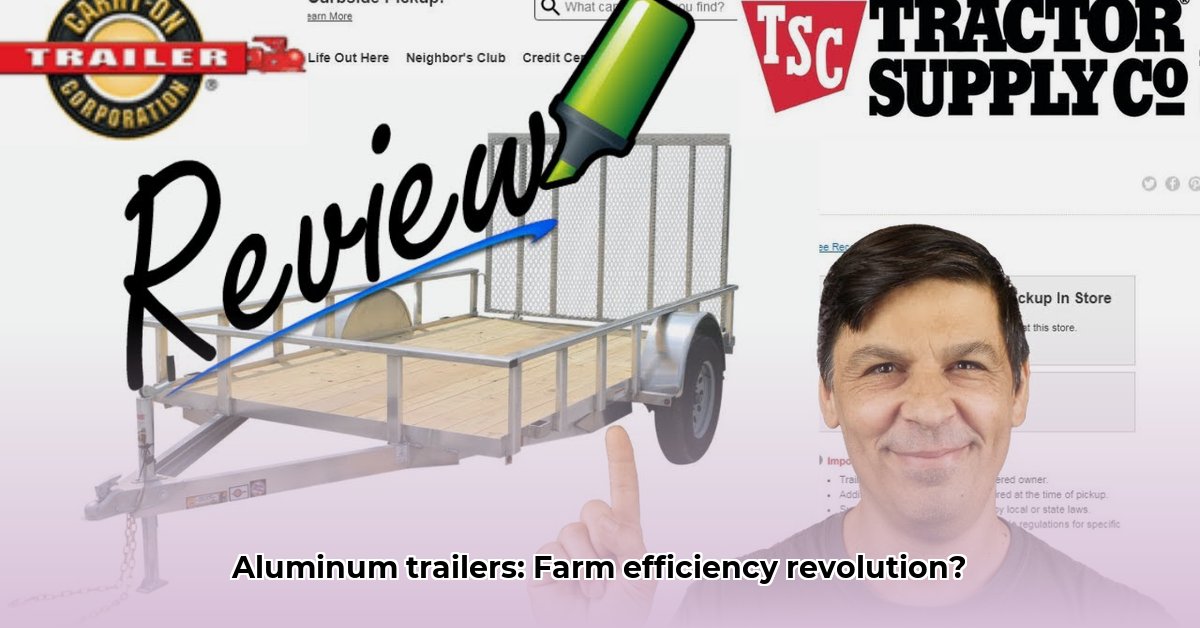
Tractor Supply Aluminum Trailers: A Sustainable Agriculture Solution?
Choosing the right equipment is crucial for efficient and environmentally conscious farming. This guide explores the viability of Tractor Supply's aluminum trailers as a sustainable solution for your agricultural needs. We'll examine their benefits and drawbacks, providing a framework for making an informed decision that aligns with your farm's goals and environmental responsibility. For more options, check out these Tractor Supply spreaders.
The Lightweight Advantage: Fuel Efficiency and Reduced Emissions
Tractor Supply aluminum trailers offer a significant advantage: reduced weight compared to their steel counterparts. This translates directly to improved fuel economy. How significant is this impact? Consider this: lighter trailers mean less strain on your towing vehicle, resulting in lower fuel consumption and a smaller carbon footprint. Every gallon of fuel saved represents a direct benefit to both your operational costs and the environment. Isn't a smaller environmental footprint a worthy goal for any farmer?
But does this lighter weight compromise strength? Modern aluminum alloys demonstrate surprising durability. While perhaps not as impact-resistant as steel in every scenario, they readily withstand the demands of typical farm work. With proper maintenance, an aluminum trailer offers a long lifespan, reducing the need for frequent replacements and minimizing waste. This longevity alone contributes significantly to their overall sustainability profile.
Maneuverability and Operational Efficiency
The reduced weight of aluminum trailers isn't just about fuel efficiency; it also enhances maneuverability, particularly on challenging terrain. Imagine navigating bumpy fields or narrow farm lanes. The lighter weight improves handling, reducing strain on your vehicle and potentially minimizing the risk of getting stuck. Fewer wasted trips translate directly to increased operational efficiency. How much time and fuel might you save with an easier-to-handle trailer?
The size of the trailer is also critical. Tractor Supply offers a variety of sizes, ensuring a suitable option for your specific needs. However, regardless of the material, it's crucial to avoid overloading. Overloading poses safety risks and can damage the trailer, negating many of its benefits.
Environmental Considerations: A Lifecycle Perspective
While aluminum production requires considerable energy, its recyclability offers a significant advantage. The environmental impact of aluminum production must be considered in the context of the trailer's entire lifecycle. The longer lifespan of an aluminum trailer compared to steel offsets the initial energy expenditure during manufacturing. This makes it essential to adopt a holistic perspective, considering the entire production and disposal process.
Furthermore, minimizing transportation distances can reduce the environmental burden. If feasible, sourcing trailers locally from Tractor Supply or other local suppliers reduces emissions from trucking. Locally sourced materials also reduce the transport-related carbon footprint. Finally, aluminum’s high recyclability at the end-of-life significantly reduces landfill waste.
Choosing the Right Tractor Supply Aluminum Trailer: A Practical Guide
Selecting the ideal aluminum trailer requires careful consideration of several factors. Here's a step-by-step guide to assist you:
Assess Your Needs: What will you primarily haul? (Hay bales, livestock, equipment?) Knowing the typical weight and dimensions of your loads is crucial.
Consider Your Terrain: Do you operate mainly on smooth roads or rough, uneven fields? Terrain significantly impacts trailer suitability.
Review Specifications: Pay close attention to specifications like payload capacity, dimensions, and axle configuration. Carefully examine the Tractor Supply product details.
Budget and ROI: Weigh the initial cost against long-term savings in fuel, maintenance, and reduced replacements. The higher initial cost of an aluminum trailer may be offset by substantial long-term savings.
Maintenance Plan: Aluminum trailers require proper maintenance to prevent corrosion. Develop a maintenance schedule to ensure the trailer’s longevity.
Weighing the Pros and Cons: Aluminum vs. Steel Trailers
To simplify your decision-making process, let's summarize the key advantages and disadvantages:
| Pros | Cons |
|---|---|
| Lighter weight, leading to better fuel economy | Higher initial purchase price compared to steel trailers |
| Enhanced maneuverability, especially on uneven terrain | More susceptible to corrosion without proper maintenance |
| Longer lifespan, reducing replacement needs | May require specialized tools for certain repairs |
| Recyclable at end of life, reducing landfill waste | Potentially less impact-resistant than steel in some cases |
Remember, the optimal choice depends on your specific circumstances and priorities. Careful consideration of all these factors is paramount before committing to a purchase.
Beyond the Trailer: Embracing Sustainable Agricultural Practices
Dr. Emily Carter, Professor of Chemical and Biomolecular Engineering at Princeton University, emphasizes: "Sustainable agriculture requires a holistic approach, considering not just individual pieces of equipment but the entire farming operation. Efficiency in every step contributes to reducing the overall environmental footprint." This underscores the importance of integrating sustainable practices throughout your farming operations. Route optimization, load maximization, and exploration of alternative fuels all contribute to maximizing efficiency and minimizing environmental impact. Remember, sustainability is a journey, not a destination.